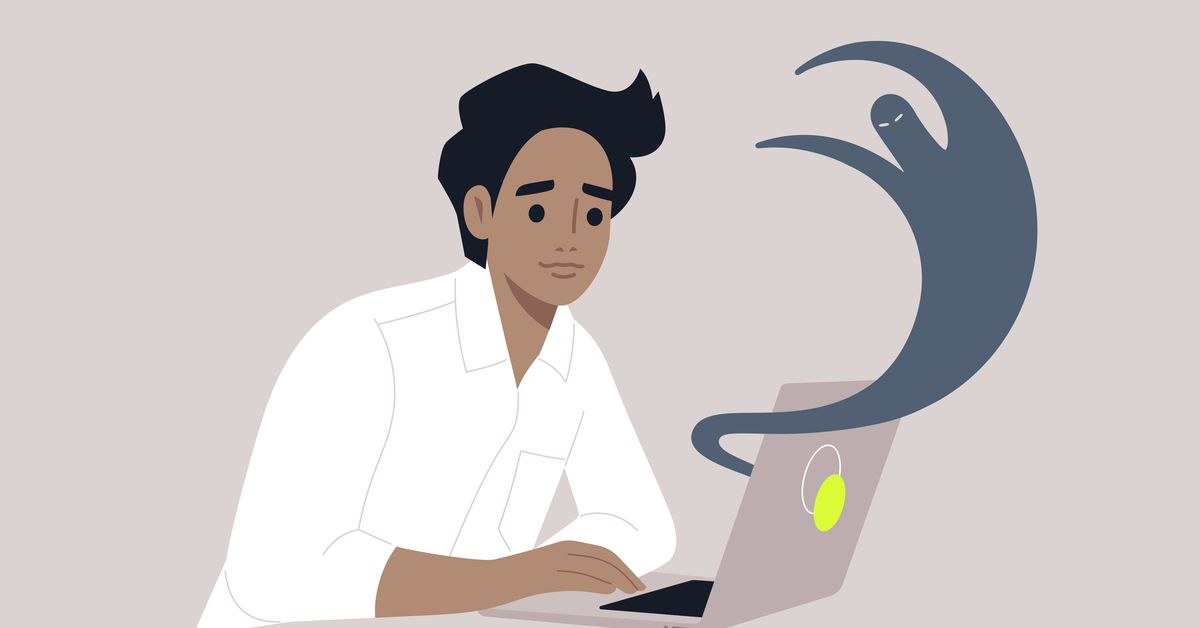- cross-posted to:
- [email protected]
- [email protected]
- cross-posted to:
- [email protected]
- [email protected]
Gen Z falls for online scams more than their boomer grandparents do::The generation that grew up with the internet isn’t invulnerable to becoming the victim of online hackers and scammers.
For all the older folk pointing fingers: “But because Gen Z relies on technology more often, on more devices, and in more aspects of their lives, there might just be more opportunities for them to encounter a bogus email or unreliable shop”
Great grandparents. Millenials are their parents, Gen X are their grandparents, Baby Boomers are their Great grandparents. If you’re too stupid to get the generations right you’re probably too stupid to get the rest of the facts of the “journalism” right.

Holy shit this needs additional jpeg

Excellent thanks x
Bad article that makes it difficult to find the study they’re citing.
However. It would not surprise me if true. I’m sorry but so many of you GenZ are the most gullible people I’ve even seen.
Maybe we millenials are good at not being scammed because we grew up during the infancy of the internet. Our mistakes were not punished as severely. There was no widespread PayPal, cashapp, venmo or stuff like that. At worst we’d lose items in WoW that wouldnt matter in 6 months anyway because the new expanaion would come. These days a kid will lose his knife in CSGO somehow valued at $600.
Still makes me sad to see that MLM scams are thriving within all generations. Just heartbreaking.
Breaking news: children are more gullible than adults.
“children”.
“Researchers and popular media use the mid-to-late 1990s as starting birth years and the early 2010s as ending birth years”
(source wikithingy)
early 2010s as ending birth years
Which means, depending on what exact years you’re going with, the youngest gen z are roughly 13 years old, possibly younger, and roughly half of them are minors, I think it’s fair to call those parts of the demographic children in a lot of contexts. Most of them aren’t old enough to drink, only a handful of them are old enough to rent a car from most companies. Most of them are still in school, still living at home with their parents (not that I’m throwing shade, I was still living at home at their age, my wife didn’t finally graduate until she was in her 30s, that’s just kind of the way things are these days for a lot of people)
Teenagers and younger 20-somethings are capable of a lot of things, but they have little to no firsthand experience with the real world. They know enough to get themselves into trouble, but not enough to avoid trouble or get themselves out of it. That’s just part of growing up.
I know plenty of people the same age as me who fell for various kinds of scams in their teens and 20s, a lot of craigslist scams, MLMs, various phishing emails, sending money to random online “friends” only to have them disappear afterwards, every week someone’s Facebook was getting hacked, etc. And while we grew up with the internet, a lot of the potential avenues for scams hadn’t really fully matured yet, so it was easier to sort through the noise. There wasn’t a whole lot of user-generated content and many websites didn’t need any kind of account to use, so after you learned not to click the flashing banner ads saying you won something and ignore weird emails, you were mostly pretty safe, and we adapted to all the new stuff as it came around and mostly learned how to sort out the good from the bad.
If we’d been thrown headfirst into the internet of today, I’m sure we would have fallen for just as many if not more scams.
There’s probably also a lot more research now into who is falling for what kinds of scams and how frequently. If you got scammed in 2003, there’s a good chance not too much came of it, maybe you had to close some bank or credit card accounts that got compromised, but cops often wouldn’t really know what to do about it, you couldn’t really post about it anywhere unless you had your own blog, Myspace was just getting started, Facebook wasn’t out yet, maybe your 12 friends on xanga would read about it. And unless some survey taker at the mall or at your college or something asked you about it, there probably wasn’t too many good ways for researchers to gather data about your experience from you.
Nowadays everyone has their own little soapbox, there’s a lot of ways for people doing research on this sort of thing to find you and reach out, and overall it’s a lot better understood.
As per usual, everyone above the age of 40 is a Boomer and everyone below the age of 40 is a Millennial. All other definitions have to bend to accommodate.
My Gen z partner is 23.
deleted by creator
11 is the youngest. Goes all the way to 26.
The youngest gen-z turns 14 this year. Gen alpha starts with those born in 2010.
Confused 1997er here, lol
Those are called “gen alpha” these days.
I’m at the razor’s edge between millennial and zoomer and I’m in my late 20s
It’s ok, it freaks me out too
deleted by creator
There is no age cutoff. You’re born in a generation and you stay that generation your entire life.
NO! Look at me! I am the Boomer, now.
There is no age cutoff.
Technically, there is - it’s just that the cutoff also goes up every year.
Breaking news: Gen Z uses more internet than their grandparents
Breaking news: many Gen Zs’ grand parents are not boomers, but Silents.
Yeah, that’s my suspicion too. If more gen z are using the internet compared to boomers, then it makes sense that more of them would fall for scams.
This is the best summary I could come up with:
“People that are digital natives for the most part, they’re aware of these things,” says Scott Debb, an associate professor of psychology at Norfolk State University who has studied the cybersecurity habits of younger Americans.
In one 2020 study published in the International Journal of Cybersecurity Intelligence and Cybercrime, Debb and a team of researchers compared the self-reported online safety behaviors of millennials and Gen Z, the two “digitally native” generations.
But because Gen Z relies on technology more often, on more devices, and in more aspects of their lives, there might just be more opportunities for them to encounter a bogus email or unreliable shop, says Tanneasha Gordon, a principal at Deloitte who leads the company’s data & digital trust business.
Staying safer online could involve switching browsers, enabling different settings in the apps you use, or changing how you store passwords, she noted.
Gordon floated the idea of major social media platforms sending out test phishing emails — the kind that you might get from your employer, as a tool to check your own vulnerabilities — which lead users who fall for the trap toward some educational resources.
But really, Guru says, the key to getting Gen Z better prepared for a world full of online scams might be found in helping younger people understand the systems that incentivize them to exist in the first place.
The original article contains 1,313 words, the summary contains 228 words. Saved 83%. I’m a bot and I’m open source!
… but, but, but all the zoomers in here like to act like they are savvy when it comes to scams and they always seem to think they know better than everyone else.
Zoomers on Lemmy probably know better.
It would be nice to see their sample grouping though. If someone leaves a finding statement to fit something as broad as an entire generation, it leaves questions as to who exactly was polled. I don’t just mean overall, I would like assurance that every age group has it’s own equal representation.
I would expect that a very large number of people across various countries, ethnicities, education levels, health levels, and more for these findings to be at all legitimate. It would be silly to try to define the entire planet’s worth of a generation off of a relatively small sample size, like 500 people from across 3 countries.
I would also love to see if the actual questions were biased or not, and if this group has any incentives for certain findings. I can’t really say that VOX is one of my go-to sources for serious stuff either, though.
Learning about media bias was HUGE when I was in school. It’s everywhere.
I think you give them too much credit.
I mean they are, these stats are aggressively manipulated against gen z. Its per population not per online population, boomers have their lives designed around not requiring the internet, gen z doesn’t really have a choice
That’s not how statistics work. The article is talking about the entirety of Gen Z, inferring that the same must be true for any subset of that group is just wrong.
Edit: Your downvote doesn’t change statistics, @[email protected]
Maybe it’s just a wisdom kind of thing? Gen Z is still young and learning the ropes of adult life. Boomers have more years on them to learn what is or isn’t a scam.
You are hereby banished from the internet for even mildly defending boomers!
I think it’s hilarious that this young generation thinks it’s the best one ever. :)
I don’t think so. I heard Millennials are the best with this stuff making us the outlier because we grew up in an age of constant tech advancement and during a time when a lot of things weren’t totally consumer friendly yet so we had to problem solve tech a lot.
Pirating played a big role in this with limewire and stuff but so did Xanga, Myspace and Tumblr having you learn basic coding to make shit cool.
The article could rather flip and say Millennials don’t fall for scams like everyone else does. They grew up with the Internet but we pioneered it.
i like this take. especially since im a millennial haha
Exactly. I’m a millennial and had to troubleshoot a lot for my boomer parents and gen x siblings.
Although I work in tech now, I didn’t until my third career.
I’ve felt the same. Millennials with tech and the silent generation / early boomers all seem to be much better with mechanical things like cars. Growing up having to troubleshoot is big.
also add that we, millennials, grew up with the common knowledge that internet is a wild place, never give out your personal data, credit card numbers or personal photos. Gen-z grew up in a world that they needed to purposefully upload their whole life on the cloud.
idk, here piracy is still very prevalent with all generations and doesn’t seem like it impacts scammability.
Piracy has become kind of easier and standard. I haven’t checked but I bet there is a discord and youtube community about pirating. That didn’t exist. I learned about torrenting from an online friend through Maplestory. Limewire was a thing some kid at school told you about. And we all got viruses doing it.
It felt like you had to know a guy to know anything. Now you can just google and the communities for pirating are massive now.
Kids these days cant tell which download button is the real one
That’s why you a need a package manager
A package manager for piracy?
That seems like a cool idea actually…
Yes, it’s called torrenting software. If you are just downloading regular things using a “download” button, that’s amateur piracy.
You gotta raise those sails up, that’s rookie piracy
Why not sail the usenet ocean?
I rather be free pirate than a paid pirate
I’m a pay to leech pirate for legal reasons 😇
Running modified executables you find on torrent sites seems worse
Software is software. You’re downloading shady software off the Internet anyway, but there’s one key difference:
- Torrent sites (such as The Pirate Bay) usually have systems of trusted uploaders. These are marked with a green/purple skull next to the file in search results.
- A torrent with a large number of seeders (think: hundreds or thousands) is less likely to contain a virus because nobody honest would seed a malware torrent and it’d cost a lot to fake that many seeders across the world.
- Torrenting software verifies the integrity of downloaded data. It uses a cryptographic hash function for this so it’s impossible for a seeder to send you a tampered file (that is different from the file you intended to download). When you use a torrent file or magnet link, it contains the hash of the file so if what you receive does not match the hash then the torrenting software will discard it.
These are marked with a green/purple skull next to the file in search results.
do you think gen-z is able to somehow hover over the icons to see the tooltip and understand what these skulls are for when they’re using their phone for everything?
Who is torrenting stuff on their PHONE?!
(Unless using it to control their PC remotely)
This assumes a bad actor doesn’t flood the torrent with their own peers. It would be trivial to set up a couple hundred peers to distribute malware.
Not sure if it was ever confirmed, but some years back it was speculated that the MPAA or associated groups were putting out bad torrents full of broken files to stop people from pirating movies.
A “couple hundred peers” is a lot easier said than done. That being said, it does happen and you are correct that having a lot of seeders doesn’t guarantee a safe download.
All of the three conditions I mentioned are neither sufficient nor necessary for a safe download, but there is a strong correlation. Unless the torrent is official (e.g. official Linux distro torrents), there is always some chance of a bad download. The chance can be low but is never zero.
I mostly agree with you, except that The Pirate Bay is mostly regarded as risky for software. https://rentry.co/megathread-all-purpose under “untrustworthy websites”.
I feel like it’s one of the internet’s better kept secrets that you can just Google for blogs that have music downloads, and as long as it’s not too obscure you’ll probably find it. No fake download buttons, at least none that I’ve noticed with an ad blocker. Generally, the gaudier the blog and the goofier the name, the more reliable it is.
Music, huh? free-mp3-download.net
If this story is even true, I suspect it’s because partly because fake sites are very convincing and easy to make - social media is out control for scam ads too, especially instagram anecdotally (I stopped somebody getting scammed).
Yeah no shit I’m surprised even 8% of boomers are online, they’re using the only perfect antivirus - abstinence
Been online before you were born, kid.
Yet still not wise enough to understand time means nothing if you do nothing with it
That and a lot of stuff is no longer email scams. They have moved on to platforms like Discord that would be rare for a boomer to use. Even viruses are hardly an issue for them because everything is mostly done on mobile now. I know zero boomers who would say I am going to install this random .apk for a cool app that was suggested to me… instead it would just be “the app you recommend doesn’t exist, it’s not in the Play/Apple store”
It’s this weird Era where you almost need a little more technological literacy to be scammed, but not enough to actually recognize a scam.
Generation X forgotten once again. Whatever.
(It was kind of expected at the time that the Millennials would be named Generation Y because they followed us, but that name never took hold. So they skipped Y and went straight on to Z, then continued with A.)
It wouldn’t be so bad but when they do remember us it’s to lump us in with our parents
This right here. More poignantly perhaps since the Boomers (not everyone in that age group, obviously) ruined Gen X lives first, before they destroyed the futures of subsequent generations, so we’ve been watching this dumpster fire for decades and warning about how bad it could become.
What might be unique to X-ers is that we witnessed the social fabric in the U.S. falling apart in the 80’s under Reagan–when the likelihood of a blue-collar worker having a solid career at a good company for life, supporting a family on one income, and being able to retire without living in poverty went from being a common thing to more of a lost dream.
So yes, to be lumped in with the same generation that pulled the rug out from under us is adding insult to injury.
There are more typos than correctly typed words here.
Better?
Just out of bed and bad at phone touch keyboard
Yep sure is!
Amusingly, your post forgets either the Millennials or Generation Z.
Gen Y are the Millennials and Gen Z are the Zoomers, which sounds more like a street gang from a Silver Age comic that it has any right to. Millennials and Zoomers tend to get conflated just like Boomers and Gen X do but they are distinct.
If you were born before the early 80s or after the mid-90s you are not a Millennial, you’re a Gen Xer or a Zoomer. Generation Alpha are typically the kids of Millennials and some of them are starting to enter puberty already.
Basically, you can divide generations Y and Z by whether they have any clear memories of before 9/11.
This is actually quite funny. The most connected generation ever. Lol
Who was in charge of teaching them though? Lol
Compared to older generations, younger generations have reported higher rates of victimization in phishing, identity theft, romance scams, and cyberbullying.
Why include cyber bullying?
I’m also curious about what their threshold for being “victimized” by romance scams is. I’ve wasted time chatting with romance scammers (both bots and ones with real people responding to messages), but haven’t ever given them or their shady sites my CC info, would I count as a “victim”?
Why include cyber bullying?
I believe they mean something like being victim in a case of someone extorting them by threatening to leak photos/videos?
That’s still not mixable with scams.
I think some of these just overlap. For example there can be a scammer pretending to be someone who is not. Then the victim may share content that wouldn’t share otherwise. Then the scammer extortions the victim by threatening to leak content in the victim’s social circle.
Yah, that really seems out of place with the rest of the list. How does one “fall for” cyberbullying? Where’s the scam?
Maybe being bullied into compliance?
Well, the quoted section doesn’t say falling for. It says reports victimization.
Doesn’t surprise me, really. With all the stories you hear about the younger part of GenZ not being familiar with things like files and directories because everything is just saved in this enormous bucket of things called “the cloud”. I’m sure some of the things I’ve read are ragebait, but from my own experience, the increased usability of mobile operating systems has really influenced their ability to work with “traditional” stuff, which is nothing more than logical. But yeah.
I imagine it has more to do with phones being the most common and main way GenZ becomes familiar with tech, with which you mostly just open an app and it knows which files and where they are, presenting them in a way that skips the whole file/directory experience for 95% of use cases
It’s definitely that, yeah. I just wonder how it’ll go once (if?) they have to use a computer at work later.



















